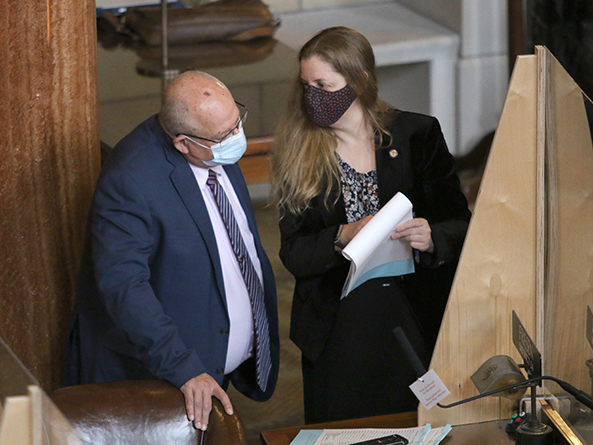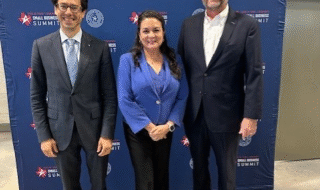February 26, 2021 Last Edit: June 5, 2025
A $20-an-hour Minimum Wage?
State Director Bob Hallstrom reports from Lincoln on the legislative and political week ending February 26.
The Legislature is heading into the last week of two-a-day committee hearings, with the exception of the Judiciary Committee, which has the pleasure of conducting public hearings for another week, having had almost 140 bills referred to the committee for processing.
The hectic committee hearing schedule has limited the ability of committees to hold executive sessions for consideration and advancement of bills. However, over 100 bills have already made their way to the floor for future debate.
Upcoming Hearings
A series of bills of interest to NFIB have been scheduled for hearing before the Business and Labor Committee on March 1, the final day that the committee will be conducting public hearings. Among the bills to be considered, are the following:
Workers Compensation
- Legislative Bill 207 – Workers’ Compensation – Waiting Time: Sen. Mike McDonnell (Omaha) introduced LB 207, which would reduce the workers’ compensation “waiting time” period from seven to three calendar days and the time period to allow compensation to be paid from the date disability began from six weeks to two weeks. (NFIB Position – Oppose)
- Legislative Bill 441 – Workers’ Compensation – COVID-19 Rebuttable Presumption: Sen. Matt Hansen (Lincoln) introduced LB 441, which would create a rebuttable presumption that any “essential worker” who otherwise qualifies for workers compensation and:
- is confirmed as COVID–19 positive on or after March 13, 2020, either by physician or by test
- has COVID–19 listed as the cause of death on the essential worker’s death certificate
- or is quarantined at the direction of the employer due to suspected COVID–19 exposure or the display of any COVID–19 symptoms to have been suffered from an accident arising out of and in the course of his or her employment.
The bill would prohibit a claim from being denied to an essential worker on the basis that the accident did not produce unexpected or unforeseen injury happening suddenly and violently and producing at the time objective symptoms of the injury.
Under the measure, an employer could rebut the presumption by affirmatively proving that the employee contracted COVID–19 outside of the workplace. COVID–19 cases would be exempted from being subject to the waiting period for payment of temporary total disability benefits and require compensation to begin from the earliest of the first date of quarantine, the date of positive testing, or the date of confirmed diagnosis of COVID–19 and continuing for the duration of the self–quarantine period that prevented the injured essential worker from returning to employment.
The measure would also prohibit such COVID–19 cases from increasing or adversely affecting an employer’s workers’ compensation insurance premium, experience rating, or modification. The bill would also exclude the notice of first injury requirement for any retroactive COVID–19 workers’ compensation claims, and only require the essential worker seeking retroactive workers’ compensation to notify his or her employer of the injury no later than two years after the effective date of the act. (NFIB Position – Oppose)
- Legislative Bill 441 – Workers’ Compensation – Confidentiality of First Injury Reports: Introduced by Sen. Steve Halloran (Hastings), LB 667 would require the Workers’ Compensation Court to withhold workers’ compensation first reports of injury from disclosure to the public, with certain designated exceptions for a period of 60 days. (NFIB Position – Oppose)
General Business
- Legislative Bill 172 – Unemployment Insurance: Introduced by Sen. Matt Hansen (Lincoln), LB 172 would allow unemployed individuals to receive their full weekly benefit amount (one-half of an employee’s average weekly wage) even in weeks when they are paid wages in an amount of half or less of the weekly benefit amount. (Current law allows such individuals to receive their full weekly benefit amount only in weeks when they receive wages of one quarter or less of the weekly benefit amount.) (NFIB Position – Oppose)
- Legislative Bill 480 – Minimum Wage: Sen. Terrell McKinney (Omaha) introduced a measure (LB 480) that would increase the minimum wage from $9 to $10 commencing January 1, 2022, and increasing by $1 each year thereafter until the minimum wage is established at $20 per hour on and after January 1, 2032, with the minimum wage to be adjusted annually thereafter an amount equal to the minimum wage from the previous calendar year increased by the percentage increase, if any, in the Consumer Price Index for all urban consumers. (NFIB Position – Oppose)
Past Reports and Related News
- February 12—NFIB Members Weigh in on Paid Leave Bill
- January 15—The Legislative Bill Mill Starts Turning

NFIB is a member-driven organization advocating on behalf of small and independent businesses nationwide.
Related Articles














